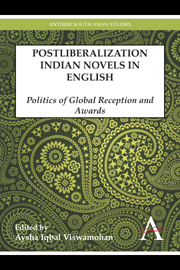Book contents
- Frontmatter
- Dedication
- Contents
- Acknowledgements
- Foreword
- Introduction
- 1 A Maverick Scholar: The Writings of Pankaj Mishra
- 2 Commodification of Post-Rushdie Indian Novels in English: Kunal Basu and the Politics of Decanonization
- 3 Marketing Lad Lit, Creating Bestsellers: The Importance of Being Chetan Bhagat
- 4 Vikas Swarup: Writing India in Global Time
- 5 The God of Small Things: Arundhati Roy's ‘Made in India’ Bookerboiler
- 6 Aravind Adiga: The White Elephant? Postliberalization, the Politics of Reception and the Globalization of Literary Prizes
- 7 ‘The Multinational's Song’: The Global Reception of M. G. Vassanji
- 8 ‘Shreds of Indianness’: Identity and Representation in Manju Kapur's The Immigrant
- 9 Inside ‘The Temple of Modern Desire’: Recollecting and Relocating Bombay
- 10 Tabish Khair: Marketing Compulsions and Artistic Integrity
- 11 Rohinton Mistry and the Canlit Imperative
- 12 Amitav Ghosh: The Indian Architect of a Postnational Utopia
- 13 Here, There and Everywhere: Vikram Seth's Multiple Literary Constituencies
- 14 Whatever Happened to Kaavya Viswanathan?
- 15 Of Win and Loss: Kiran Desai's Global Storytelling
- 16 Immigrant Desires: Narratives of the Indian Diaspora by Chitra Banerjee Divakaruni
- Glossary of Indian Words
- List of Contributors
- Bibliography
- Index
4 - Vikas Swarup: Writing India in Global Time
Published online by Cambridge University Press: 05 July 2013
- Frontmatter
- Dedication
- Contents
- Acknowledgements
- Foreword
- Introduction
- 1 A Maverick Scholar: The Writings of Pankaj Mishra
- 2 Commodification of Post-Rushdie Indian Novels in English: Kunal Basu and the Politics of Decanonization
- 3 Marketing Lad Lit, Creating Bestsellers: The Importance of Being Chetan Bhagat
- 4 Vikas Swarup: Writing India in Global Time
- 5 The God of Small Things: Arundhati Roy's ‘Made in India’ Bookerboiler
- 6 Aravind Adiga: The White Elephant? Postliberalization, the Politics of Reception and the Globalization of Literary Prizes
- 7 ‘The Multinational's Song’: The Global Reception of M. G. Vassanji
- 8 ‘Shreds of Indianness’: Identity and Representation in Manju Kapur's The Immigrant
- 9 Inside ‘The Temple of Modern Desire’: Recollecting and Relocating Bombay
- 10 Tabish Khair: Marketing Compulsions and Artistic Integrity
- 11 Rohinton Mistry and the Canlit Imperative
- 12 Amitav Ghosh: The Indian Architect of a Postnational Utopia
- 13 Here, There and Everywhere: Vikram Seth's Multiple Literary Constituencies
- 14 Whatever Happened to Kaavya Viswanathan?
- 15 Of Win and Loss: Kiran Desai's Global Storytelling
- 16 Immigrant Desires: Narratives of the Indian Diaspora by Chitra Banerjee Divakaruni
- Glossary of Indian Words
- List of Contributors
- Bibliography
- Index
Summary
Vikas Swarup is an extraordinarily successful writer. His first book, Q & A (2005), received a number of awards, including the Boeke Prize in South Africa (2006) and the Prix Grand Public at the Paris Book Fair (2007), sold well in the popular market across the world and has so far been translated into 34 languages (though it has sold translation rights in 42 languages). It was distinguished by being nominated for ‘Most Influential Book of the Year’ in 2008 by Kingstone Bookstore, the biggest chain in Taiwan. Its success skyrocketed when it was made into a British film by Danny Boyle with the title Slumdog Millionaire (2008), which was widely acclaimed by critics, received eight Oscars in the US, was hugely successful across the globe (except in India, until the Oscars) and assured Swarup's marketability. Following the triumph of the film, Q & A was reissued as Slumdog Millionaire, though the title – created by Simon Beaufoy for his award-winning screenplay – was much reviled in India and is significantly different from the book. Under this title, the book won the Heathrow Travel Product Award in 2009. Swarup's second book, Six Suspects (2008) was immediately picked up for film rights and is being produced by Paul Raphael's Starfield Productions under BBC Films and being scripted by John Hodge, who wrote the screenplay for Danny Boyle's Shallow Grave (1994) and Trainspotting (1996).
- Type
- Chapter
- Information
- Postliberalization Indian Novels in EnglishPolitics of Global Reception and Awards, pp. 31 - 40Publisher: Anthem PressPrint publication year: 2013



